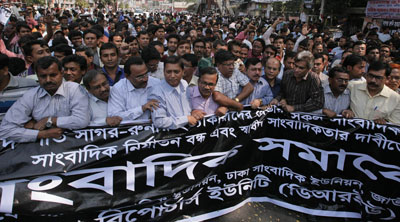On February 11, two Bangladeshi television journalists, Meherun Runi and her husband Golam Mustofa Sarowar, were murdered in their Dhaka home. Their 5-year-old son found their bodies. No arrests have yet been made and no motive has been publicly disclosed, although police claim they know why the couple was killed. Journalists have plenty of reason to be skeptical, and they staged a nationwide strike today to call attention to the case.
Monirul Islam, a deputy police commissioner in Dhaka, told The Daily Star today that “we are almost certain about the motive behind the murder. But it will not be wise to disclose it at this moment for the sake of investigation.”
In a country where journalists’ murders often go unpunished, these assurances can’t be taken at face value. Today from noon to 1 p.m., Bangladeshi journalists banded together to protest the murders of their colleagues and to call for swift justice. Newspaper, online, and broadcast journalists joined the strike, ceasing work for an hour. In Dhaka, journalists laid down their cameras and pens in front of the National Press Club, and similar events were held around the country, The Associated Press reported.
At least 12 Bangladeshi journalists have been killed for their work since 1992, when CPJ began keeping track. Convictions have been won in only three of those cases. In the other nine cases, the killers went free. In many more cases, journalists have been threatened or physically attacked without recourse from law enforcement authorities. At the same time, recent years’ reforms have not gone far enough to reassure journalists that they can work without fear of government reprisal.
Bangladeshi authorities need to convince the media that this time is different. But their promises aren’t enough. No matter what the motive, only a thorough, credible investigation into the killing of Runi and Sarowar–and justice for their murderers–will do that job.
